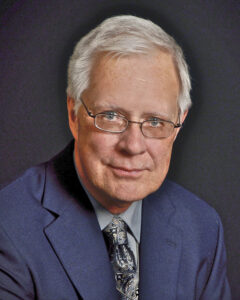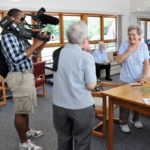By Greg Cusack
Having recently finished a Great Course lecture series on Shakespeare’s tragedies, I am now immersed in a course on Greek tragedy. In both cases, the marvels of language are both essential and in full display.
While Greek tragedy seldom contains, except in relative snippets, the soaring and loquacious language employed by Shakespeare, it — like Shakespeare’s plays — relies heavily upon language to convey mood, emotion, and even physical place.

In both instances, men (there were no women actors in ancient Greece or in Elizabethan England) needed to be trained on how to use their voices. Since there were no devices to project their voices, they needed to not only speak with sufficient projection that people in relatively distant seats could hear them, but also in such a manner as to convince their audience of their character and emotion.
Fourth-century Athens not only witnessed the artistry of such tragedians as Aeschylus, Sophocles and Euripides, but also the flourishing of democracy (a limited form of democracy, of course, because only free males had a role in governance).
Little wonder, then, that various schools designed to teach young men how to be rhetoricians quickly became popular. Rhetoric is, essentially, the practice of speaking well and convincingly in public, something particularly important if one wished to play any role of persuasion in an assembly of one’s peers.
I was trained in rhetoric, too, in my first years in high school, including how to structure a presentation and the use of inflection, emotion, gestures and even facial expression. I also was trained to debate. While the ideal of using language skillfully is to persuade others of the “rightness” of one’s position rhetoric, in itself, it is neutral and can be used for less worthy purposes.
Because debate is an art form in which teams compete against another not for being the most accurate or truthful but for having the best or most convincing argument, I also learned some “tricks” that could be useful in trying to get the other team “off track” — verbal chaff to obfuscate, even irritate. Thus, I learned early on that getting the other person angry was a sure way to muddle his case.
In my early years as a college instructor, I employed what I had learned and, in many ways, in so doing was also an actor, at least in the sense that I was “on stage.”
This same training in language and speaking obviously proved helpful when I decided to try public office by running for the Davenport City Council in the autumn of 1969 and then, in 1972, running for the first of five terms as a member of the Iowa House of Representatives.
I quickly and happily moved from the purpose of “winning” an argument that was so essential to the debate arena to the much more pleasurable ways of interacting with colleagues through appropriate humor (especially when my conversational finger pointed to me) and through respectful questioning.
Somehow, I had been graced by the visitation of Lady Truth that moved me from the centrality of my point of view to curiosity about how and why others could hold different, even opposite, views.
In both Greek and Hebrew, the word for truth or wisdom — “Sophia” and “chokmah” — are feminine, and “Lady Wisdom” plays a major role in the Bible’s wisdom books. Interesting, since both cultures were male-dominant.
Truth is a worthy goal but, quoting Pilate from Jesus Christ: Superstar, “Is my truth the same as yours?” I quickly came to understand that just as I was truly to be the servant, spokesperson and guide to the people of my legislative district, so also was I a servant/enabler of my colleagues in the legislature.
If I could use my skills to help us arrive at the better — whether this was something of an understanding or an actual piece of legislation — that we would all be served.
So, what Lady Truth taught me was that while I could not depend upon knowing “the truth,” nor believing that “my way or perspective” was necessarily better or more accurate than another’s, I must never attempt to deceive, lie, incite or mislead, for that would be putting my skills to an evil purpose.
I offer this reflection in today’s miserable political environment where some in the public square use their language skills not only to deceive and lie, but to harm.
The ancient advice given to physicians — First, do no harm! — also applies to each of us as citizens regarding our responsibilities to each other. Each of us can refuse to deceive, lie, incite or mislead! May we please do so!
(Greg Cusack taught college, served on the Davenport City Council from 1969-73, and the Iowa House of Representatives from 1971-81. He then served as executive director of National Catholic Rural Life Conference from 1981 until late 1986. His public service continued in other areas until he retired as Chief Benefits Officer of the Iowa Public Employees Retirement System in 2004.)











